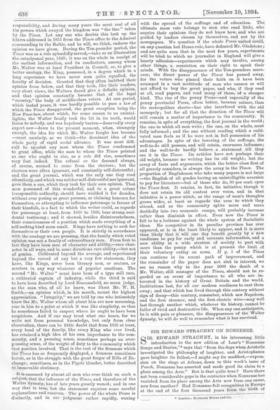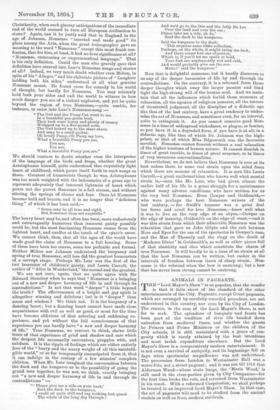SIR EDWARD STRACHEY ON NONSENSE.
SIR EDWARD STRACHEY, in his interesting little introduction to the new edition of Lear's "Nonsense Songs and Stories,"* -says that "from the days when Aristotle investigated the philosophy of laughter, and Arietophanes gave laughter its fullest,—I might say its maddest,—expres- sion on the stage at Athens, down to this week's issue of Punch, Nonsense has asserted and made good its claim to a place among the Arts." But is that quite true P Have there not been considerable gaps in the centuries when Nonsense has vanished from its place among the Arts now from one cause, now from another Had Nonsense full recognition in Europe at the end of the first thousand years from the birth of
* London' Frederick Warne and Cc.
Christianity, when such gloomy anticipations of the immediate end of the world seemed to turn all European civilisation to stone ? Again, can it be justly said that in England in the age of Johnson, Nonsense "asserted and made good" its place among the Arts, when the great lexicographer gave no meaning to the word " Nonsense " except this most frank con- fession, that for him, at least, it had no true significance at all? "Nonsense, unmeaning or ungrammatical language." That is his only definition. Could the man who gravely gave that definition have entered into Lear's Nonsense songs and stories at all? Indeed, we very much doubt whether even Milton, in spite of his " Allegro " and his elaborate picture of "Laughter holding both his sides," understood at all what genuine Nonsense meant. He found room for comedy in his world of thought, but hardly for Nonsense. You may solemnly hold both your sides and call the world to witness in how much danger you are of a violent explosion, and yet be quite beyond the region of true Nonsense,—quite unable, for instance, to enter into Lear's Nonsense-song :— "The Owl and the Pussy-Cat went to sea
In a beautiful pea green boat, They took some honey and plenty of money Wrapped up in a five-pound note.
The Owl looked up to the stars above
And sang to a small guitar, Oh lovely Pussy, Oh Pussy my love, What a beautiful Pussy you are, You are, You are,
What a beautiful Pussy you are."
We should venture to doubt whether even the interpreter of the language of the birds and frogs, whether the great Aristophanes himself, quite understood that exquisitely light heart of childhood, which pours itself forth in such songs as these. Greatest of humourists though he was, Aristophanes was too much weighted with the indecencies of a gross age to represent adequately that innocent lightness of heart which pours out the purest Nonsense in a full stream, and without stirring the springs of shame and fear. Once let Nonsense become bold and brazen, and it is no longer that "delicious thing" of which it has been said,— " Sense may be all true and right, But Nonsense thou art exquisite."
The heavy heart may be, and often has been, more audaciously and extravagantly humorous than innocent gaiety possibly could be, but the most fascinating Nonsense comes from the lightest heart, and curdles at the touch of the cynic's sneer. We cannot think, then, that all the ages of the world have made good the claim of Nonsense to a full hearing. Some of them have been too coarse, some too pedantic and formal. Neither Milton nor Johnson understood the buoyancy and spring of true Nonsense, still less did the greatest humourists of a corrupt stage. Perhaps Mr. Lear was the first of the two laureates of children's gaiety, and Lewis Carroll, the author of "Alice in Wonderland," the second and the greatest.
We are not sure, again, that we quite agree with Sir Edward Strachey when he says that "Nonsense is a bringing out of a new and deeper harmony of life in and through its contradictions." Is not that word " deeper " a little beyond the truth The effervescence of a bright and gay spirit is altogether winning and delicious ; but is it " deeper " than sense and wisdom? We think not. It is the buoyancy of a dancing heart; but a dancing heart cannot have made close acquaintance with evil as well as good, or must for the time have become oblivious of that sobering and saddening ex- perience, and yet without the full consciousness of that experience you can hardly have "a new and deeper harmony of life." True Nonsense, we venture to think, shows little trace of that experience of grief and shadow and care which the deepest life necessarily encounters, grapples with, and subdues. It is the ripple of feelings which are either entirely free of the "heavy and the weary weight of all this unintelli- gible world," or so far temporarily emancipated from it, that it can indulge in the ecstasy of a few minutes' complete oblivion. When Mr. Lear imagined the conversation between the duck and the kangaroo as to the possibility of going the grand tour together, he was not, we think, exactly bringing oat "a new and deeper harmony of life in and through its contradictions " :— "'Please give me a ride on your back,' Said the duck to the kangaroo,
I could sit quite still and say nothing but quack
The whole of the long day through !
And we'd go to the Doe and the Jelly Bo Lee Over the land and over the sea ; Please take me a ride, oh do,' Said the duck to the kangaroo.
Said the kangaroo to the duck, This requires some little reflection,
Perhaps, on the whole, it might bring me luck,
And there seems but one objection, Which is, if you'll let me speak so bold, Your feet are unpleasantly wet and cold, And would probably give me the roo- Matiz V said the kangaroo."
Now that is delightful nonsense, but it hardly discovers to us any of the deeper harmonies of life by and through its contradictions. On the contrary, it is a rebound from those deeper thoughts which sway the larger passion and bind tight the high-strung will of the human soul. And we main- tain that all the influences which forbid these moments of relaxation, all the agonies of religions penance, all the terrors of threatened judgment, all the discipline of a didactic age like that of the last century, have a great tendency to under- mine the art of Nonsense, and sometimes even, for an interval, quite to extinguish it. As you cannot conceive good Non- sense in a time of widespread wickedness, or plague, or famine, so you have it in a degraded form, if you have it at all, in a didactic age, like that of which Dr. Johnson was the high. priest, or that of which Miss Edgeworth was the favourite novelist. Nonsense cannot flourish without a real relaxation of the higher tensions of human nature. It cannot flourish in times of great trouble, in times of great suspense, or in times of very strenuous conventionalities.
Nevertheless, we do not believe that Nonsense is ever at its best unless there be some real strain upon the mind from which there are seasons of relaxation. It is men like Lewis Carroll,—a great mathematician who knows well what mental strain is,—men like Mr. Lear, who had given almost the earlier half of his life to a great struggle for a maintenance against many adverse conditions, who have written for us the very best Nonsense. Even Cowper and Goldsmith,— who were perhaps the best Nonsense writers of the last century, for Swift's humour was a great deal too fierce and cruel for true Nonsense,—knew well what it was to live on the very edge of an abyss,—Cowper on the edge of insanity, Goldsmith on the edge of want,—and it was this strain from which their admirable Nonsense was the relaxation that gave us John Gilpin and the suit between Nose and Eyes for the use of the spectacles in Cowper's case, and the Man of Thessaly and the elegy on the death of 'Madame Blaize ' in Goldsmith's, as well as other pieces full of that elasticity and elan which constitute the charm of true Nonsense. It will hardly ho in a time of no strain at all that the beat Nonsense can be written, but rather in the intervals of freedom between times of sharp strain. Non- sense is the rebound when the bow is unstrung ; but a bow that has never been strung cannot be unstrung.







































 Previous page
Previous page